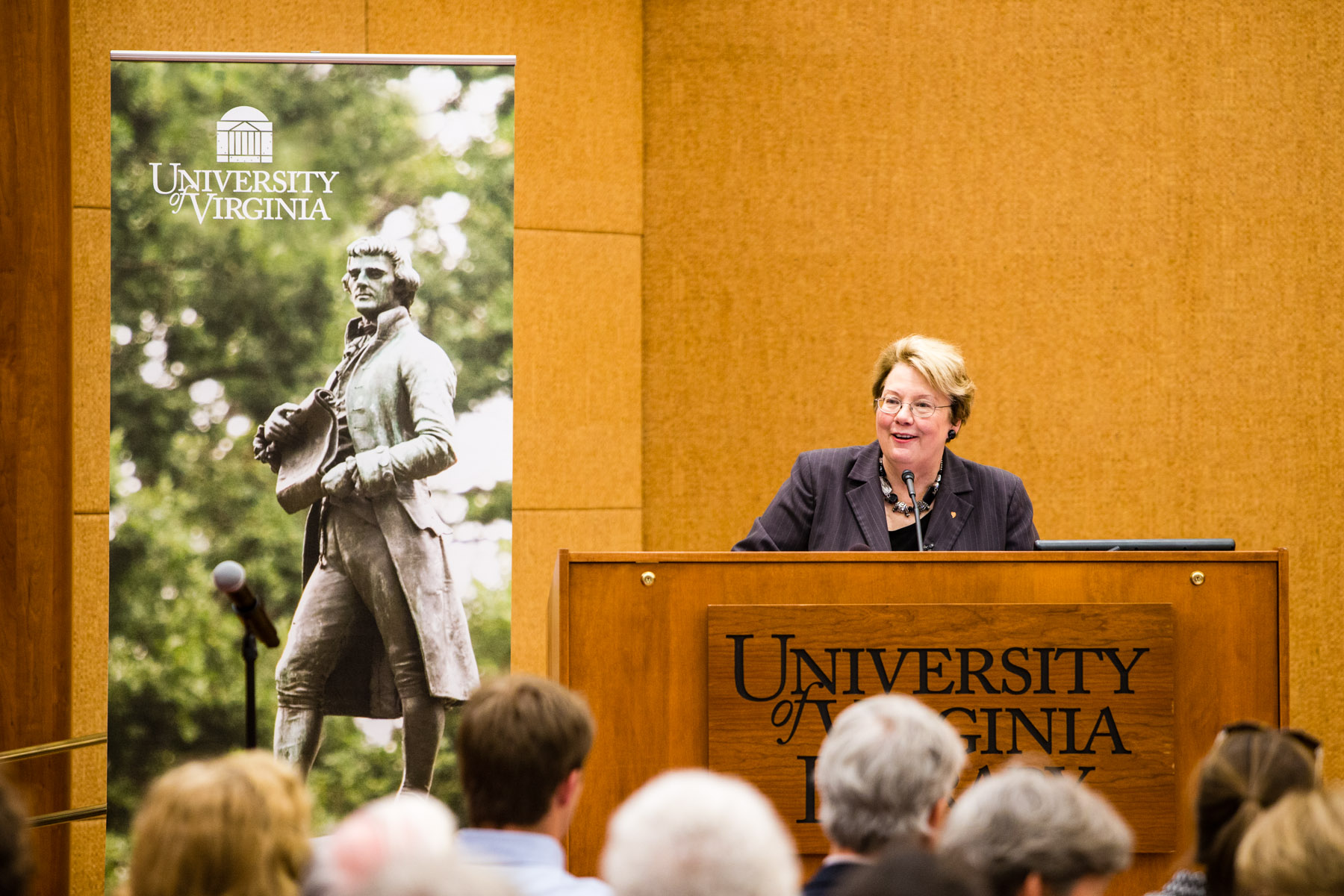University of Virginia President Teresa A. Sullivan delivered “state of the University” remarks Thursday with a contextual twist that sought to explore what Thomas Jefferson might think today of the institution he founded.
As she spoke to members of the University community at the Harrison Institute-Small Auditorium, a banner displaying an image of the Jefferson statue on the Rotunda plaza hovered over Sullivan’s right shoulder. Jefferson’s gaze appeared fixed on the horizon, as if looking ahead – a tack Sullivan mirrored in her remarks.
“We have a lot of work to do, so let’s work hard, work together and let’s aim high,” she said, “as high as our founder aimed when he raised this place up from nothing, and from his imagination created the University of Virginia we cherish today.”
Sullivan used the theme of her speech, “A Founder’s Perspective: Today’s U.Va. Through Jefferson’s Eyes,” as a vehicle to show how many of U.Va.’s key accomplishments and major challenges reflect things Jefferson considered important in his time.
In 1824, U.Va.’s founder wrote of his intention to recruit the “highest grade” of faculty. Today, Sullivan said, the University must continue this effort. Jefferson likely would be pleased by the faculty’s quality and accomplishments, she said, but also would be concerned about the challenge of offering competitive compensation to maintain that quality and attract a new generation of instructors.
In outlining the state of U.Va. today, Sullivan provided examples of the achievements of students whose research and service efforts have the potential to assist the recovery of heart attack victims, upgrade health care coverage in Africa, improve testing for Alzheimer’s disease and much more.
“More than half of our students engage in some form of research during their time here. It seems certain that our founder, who spoke so often about the ‘useful sciences,’ would approve of their work to develop new knowledge and new solutions to real-world problems,” she said.
Sullivan said AccessUVA, the University's financial aid program, has helped U.Va. make progress toward Jefferson's goal of providing education in the broadest sense, to citizens “from the richest to the poorest.” AccessUVA has helped thousands of students afford the University while avoiding massive student debt, she said, but U.Va. must address the program’s mounting fiscal pressure and find a structure “flexible enough to meet economic realities, but to still help us fulfill Jefferson’s dream of an ‘aristocracy of talent,’” Sullivan said.
The president also explored U.Va.’s modern involvement – and Jefferson’s hypothetical vantage point – in online learning, innovative research, economic development and global affairs. U.Va. continues to experiment today with MOOCS, or massive open online courses taught by University professors, available to anyone with an Internet connection.
“I think Jefferson would appreciate the way MOOCs make knowledge widely available, and generally at little cost to the student,” Sullivan said.
Costs in general, however, remain an ongoing concern in higher education, and particularly at the best public universities. Sullivan told the audience that Jefferson expressed concerns in 1817 about the level of state funding.
On this point, U.Va.’s founder would feel at home today. The General Assembly recently approved a set of budget amendments that includes positive developments for U.Va., ranging from funds to boost student enrollment and financial aid to money for Rotunda renovation. But the legislature also authorized the first raises for faculty and staff in several years without fully funding them, and U.Va. has absorbed millions in reduced state funding overall in the past decade.
“We do more with less everywhere,” Sullivan said, noting U.Va.’s ranking by U.S. News & World Report as No. 2 in quality among public universities, but No. 53 in expenditures per student.
“We are engaged in efforts at both the unit and pan-University levels to reduce costs and capture savings, improve processes and enhance efficiency, but doing it while protecting the quality of the academic enterprise,” she said.
Looking forward, Sullivan said Jefferson’s legacy as a bold thinker positions him as an ideal inspiration for the future.
“Today, we need a similar commitment to bold thinking, as we continue with our strategic planning initiative to shape the University’s future,” she said. “At this pivotal moment in our history, we need to emulate our founder’s best qualities: his inquiring mind; his insistence on making ideas useful; his willingness to discard the old ways of doing things to create new, better ways to do things.”
Sullivan said U.Va.’s ongoing strategic planning process has already revealed overarching themes. Among them:
- Multidisciplinary teams of faculty (such as medicine and engineering, or technology and design) to provide the best method to make discoveries that can help solve society’s problems.
- The University must protect and enhance its renowned residential experience for students, but also must continue to experiment with technology as an instructional and research tool on Grounds and globally.
- U.Va. should position itself as a leader in advising. This approach to “total advising” will extend beyond traditional academic advising and include career counseling and “life coaching” that reflect U.Va.’s commitment to honor and ethics.
In the question-and-answer session that followed Sullivan’s remarks, Board of Visitors member Stephen P. Long noted that, among many strong character traits, Jefferson didn’t shy away from big challenges. Borrowing from the theme of the day, Long ventured a guess at what Jefferson might think of U.Va.’s current president.
“I think Mr. Jefferson would say we have a lady of great grade, great pride and someone who will not back down from a challenge,” he said.
Long also put Sullivan on the spot with a challenge to select a single word that best captures the future of the University.
Sullivan chose “curiosity” – a word that helps propel everything from research to academics to medicine, student interests and motivations.
“Curiosity undergirds everything we do,” she said.
Media Contact
Article Information
April 11, 2013
/content/through-jefferson-s-eyes-sullivan-explores-uva-s-accomplishments-challenges

